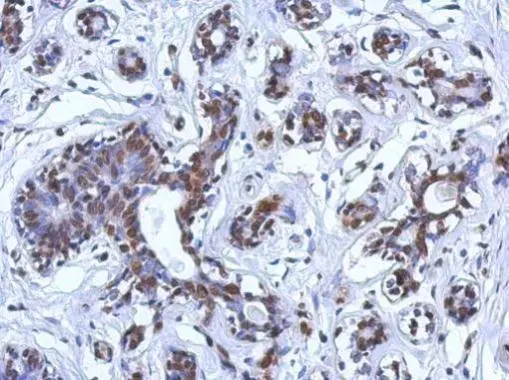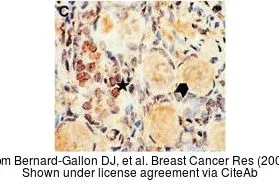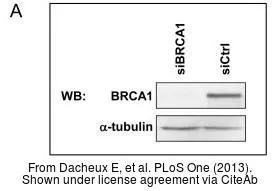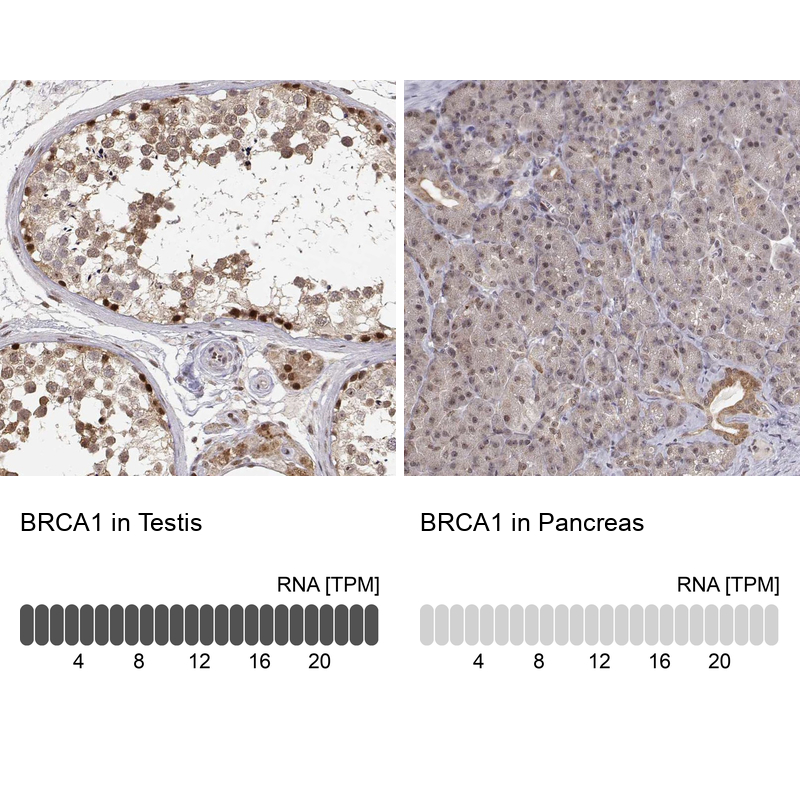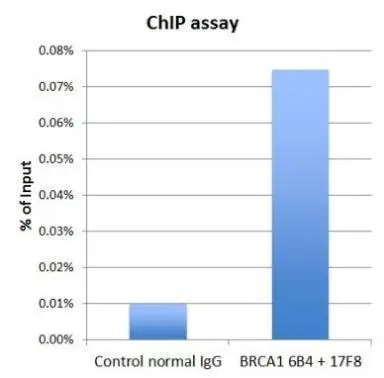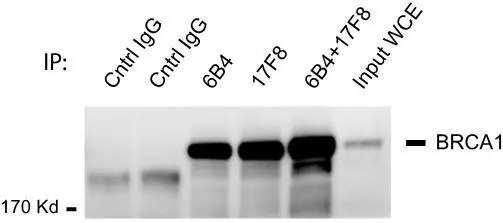![Various whole cell extracts (30 μg) were separated by 5% SDS-PAGE, and the membrane was blotted with BRCA1 antibody [8F7] (GTX70113) diluted at 1:500. The HRP-conjugated anti-mouse IgG antibody (GTX213111-01) was used to detect the primary antibody, and the signal was developed with Trident ECL plus-Enhanced. Various whole cell extracts (30 μg) were separated by 5% SDS-PAGE, and the membrane was blotted with BRCA1 antibody [8F7] (GTX70113) diluted at 1:500. The HRP-conjugated anti-mouse IgG antibody (GTX213111-01) was used to detect the primary antibody, and the signal was developed with Trident ECL plus-Enhanced.](https://www.genetex.com/upload/website/prouct_img/normal/GTX70113/GTX70113_44937_20230203_WB_23021401_498.webp)
Various whole cell extracts (30 μg) were separated by 5% SDS-PAGE, and the membrane was blotted with BRCA1 antibody [8F7] (GTX70113) diluted at 1:500. The HRP-conjugated anti-mouse IgG antibody (GTX213111-01) was used to detect the primary antibody, and the signal was developed with Trident ECL plus-Enhanced.
BRCA1 antibody [8F7]
GTX70113
ApplicationsImmunoPrecipitation, Western Blot, ImmunoHistoChemistry, ImmunoHistoChemistry Paraffin
Product group Antibodies
ReactivityHuman, Mouse
TargetBRCA1
Overview
- SupplierGeneTex
- Product NameBRCA1 antibody [8F7]
- Delivery Days Customer9
- Application Supplier NoteFor IHC-P: Use at an assay dependent dilution. Perform heat mediated antigen retrieval before commencing with IHC staining protocol (0.1 M citrate buffer at 95C in water bath for 20 min). Avoid nonspecific binding by incubating in normal rabbit anti-mouse serum. Incubate primary antibody overnight and use a biotin-streptavidin amplification kit. Block endogenous peroxidase with 0.3% H2O2 for 30 minutes. For IP: Use at an assay dependent dilution. For WB: 1:500-1:3000. This antibody recognizes full-length BRCA1, a 220-kDa nuclear phosphoprotein. Optimal dilutions/concentrations should be determined by the researcher.
- ApplicationsImmunoPrecipitation, Western Blot, ImmunoHistoChemistry, ImmunoHistoChemistry Paraffin
- CertificationResearch Use Only
- ClonalityMonoclonal
- Clone ID8F7
- Concentration1 mg/ml
- ConjugateUnconjugated
- Gene ID672
- Target nameBRCA1
- Target descriptionBRCA1 DNA repair associated
- Target synonymsBRCAI, BRCC1, BROVCA1, FANCS, IRIS, PNCA4, PPP1R53, PSCP, RNF53, breast cancer type 1 susceptibility protein, BRCA1/BRCA2-containing complex, subunit 1, Fanconi anemia, complementation group S, RING finger protein 53, breast and ovarian cancer susceptibility protein 1, breast cancer 1, early onset, early onset breast cancer 1, protein phosphatase 1, regulatory subunit 53
- HostMouse
- IsotypeIgG1
- Protein IDP38398
- Protein NameBreast cancer type 1 susceptibility protein
- Scientific DescriptionThis gene encodes a nuclear phosphoprotein that plays a role in maintaining genomic stability, and it also acts as a tumor suppressor. The encoded protein combines with other tumor suppressors, DNA damage sensors, and signal transducers to form a large multi-subunit protein complex known as the BRCA1-associated genome surveillance complex (BASC). This gene product associates with RNA polymerase II, and through the C-terminal domain, also interacts with histone deacetylase complexes. This protein thus plays a role in transcription, DNA repair of double-stranded breaks, and recombination. Mutations in this gene are responsible for approximately 40% of inherited breast cancers and more than 80% of inherited breast and ovarian cancers. Alternative splicing plays a role in modulating the subcellular localization and physiological function of this gene. Many alternatively spliced transcript variants, some of which are disease-associated mutations, have been described for this gene, but the full-length natures of only some of these variants has been described. A related pseudogene, which is also located on chromosome 17, has been identified. [provided by RefSeq, May 2009]
- ReactivityHuman, Mouse
- Storage Instruction-20°C or -80°C,2°C to 8°C
- UNSPSC41116161

![Non-transfected (–) and transfected (+) 293T whole cell extracts (60 μg) were separated by 5% SDS-PAGE, and the membrane was blotted with BRCA1 antibody [8F7] (GTX70113) diluted at 1:500. The HRP-conjugated anti-mouse IgG antibody (GTX213111-01) was used to detect the primary antibody. Non-transfected (–) and transfected (+) 293T whole cell extracts (60 μg) were separated by 5% SDS-PAGE, and the membrane was blotted with BRCA1 antibody [8F7] (GTX70113) diluted at 1:500. The HRP-conjugated anti-mouse IgG antibody (GTX213111-01) was used to detect the primary antibody.](https://www.genetex.com/upload/website/prouct_img/normal/GTX70113/GTX70113_40004_20161117_WB_shRNA_watermark_w_23061221_595.webp)
